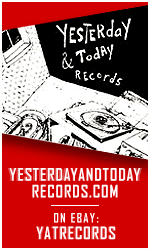

When I was just starting out in my band the Posies, the first band I had that made records and toured, etcetera, back in 1988, we were introduced to the music of Big Star. People heard our early music and assumed, correctly, that we'd find the pure harmonies, heartbreaking sentiment, and mix of rock power and Byrds-like jangling bliss a great inspiration and sympathetic vibration to our own music. It was something of a revelation, one that has probably confounded thousands of listeners when they discover these records for the first time, "How could this band not have been hugely popular?”
And that, my friends, is where the dichotomy began.
Before Big Star, if the critics loved it, if it was quality, word got around, and artists who were influential artistically, like The Doors, Jimi Hendrix, the fucking Beatles, for fuck's sake, sold millions. There was crap too, also selling millions. The only band that didn't sell was The Shaggs.
Big Star was not part of a rebellion, like the punks would be soon after. They were a hot band in Memphis, with great songs, and a huge music machine (CBS) behind them. And they failed, spectacularly. It was a tree falling in the woods though - nobody knew the band, so no one knew what they were missing. But so began the idea that there were two worlds in music - the crapmosphere of the latest pop idols, and the quality control layer that was just for those in the know. Suddenly, the idea prevailed that the better a band was - the less likely it was to sell. And in fact, the ability to turn away listeners was a sign of quality. In many ways I agree. In many ways, Big Star has nothing to do with this argument.
I digress. Big Star became heroes because they satisfied every test for quality you could apply, but also they were the ultimate underdogs, a symbol of the unjust whims of popular taste. Something was wrong with the system and here was the proof. The star factory couldn't even makes stars out of Big Star.

I knew Alex first through this context and through his music. We were fans - fans enough to consider taking our first big budget from Geffen Records and spending it at Ardent Studios in Memphis where all of Big Star's albums (and albums we loved by the Replacements, REM, Led Zep, ZZ Top) were made. We eventually decided to stay in Seattle, but via his position as the company's A&R/PR/business gettin' guy, Big Star's Jody Stephens became a fan, a friend, and a friendly familiar face when we were at events like CMJ, South by Southwest, etc.
When some college kids from Missouri threw the dice and had the boldness to enquire if Big Star would reunite for their spring concert...and Alex said yes, Jody called us to fill in the missing posts formerly held by the late Chris Bell and the retired-from-music Andy Hummel. Our first rehearsal in Seattle was where we met Alex for the first time. At first a bit of a cipher, or perhaps a sphinx, he kept his words spare. But even in those first rehearsal days we were talking about Dostoevsky... and it seemed Alex wasn't like other musicians we had played with - more interested in their bongs or their thinly-supported intellectual aspirations, if not practices. Alex was disciplined, and curious, a formidable combo.
But Alex was more than a great intellect (he was widely read, widely interested, willing and able to discuss at length virtually any subject except Big Star). He was charming, challenging, spontaneous and generous. He proposed after a short time of Jon & me playing with Big Star that our contributions merited equal pay. He drove me around Memphis pointing out the housing project where Elvis had lived at one point. We played tennis and had dinners together in his frequent visits to Paris. He introduced me to the music of Faron Young, Rodd Keith, and more. Though he had a reputation for being difficult, the Alex that I have tour managed for the last decade has been the Alex of, “Yeah, cool...whatever. No problem.”
He didn't do interviews. He didn't have email. You had to call him to ask him a question. Isn't that more sociable? I think he thought so. And it is for that sociability, as well as that integrity, that stand out among the many things I will miss about Alex.
Ken Stringfellow will join Jon Auer and Jody Stephens in a tribute to Alex Chilton at the Levitt Shell in Memphis, TN on May 15th. More special guests to be announced soon.





















1 comment:
Ken would know...awesome
Post a Comment